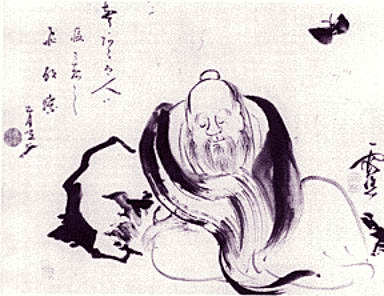Zhuangzi Frases y Citas
Zhuangzi: Frases en inglés
“The petty thief is imprisoned but the big thief becomes a feudal lord.”
Fuente: The Complete Works of Chuang Tzu
Book XXIII, ¶ 7,as rendered in the epigraph to Ch. 3 of The Lathe of Heaven (1971) by Ursula K. Le Guin, based upon the 1891 translation by James Legge, Le Guin was subsequently informed that this was a very poor translation, as there were no lathes in China in the time of Zhuangzi. The full passage as translated by Legge reads:
He whose mind is thus grandly fixed emits a Heavenly light. In him who emits this heavenly light men see the (True) man. When a man has cultivated himself (up to this point), thenceforth he remains constant in himself. When he is thus constant in himself, (what is merely) the human element will leave him, but Heaven will help him. Those whom their human element has left we call the people of Heaven. Those whom Heaven helps we call the Sons of Heaven. Those who would by learning attain to this seek for what they cannot learn. Those who would by effort attain to this, attempt what effort can never effect. Those who aim by reasoning to reach it reason where reasoning has no place. To know to stop where they cannot arrive by means of knowledge is the highest attainment. Those who cannot do this will be destroyed on the lathe of Heaven.
"Discussion on Making All Things Equal"; Variant: If right were really right, it would be so different from not-right that there would be no room for argument. If so were really so, then it would be so different from not-so that there would be no room for argument.
“Perfect happiness is keeping yourself alive, and only actionless action can have this affect.”
Ch. 18 (Martin Palmer/Elizabeth Breuily, Penguin Publishing 1996)
